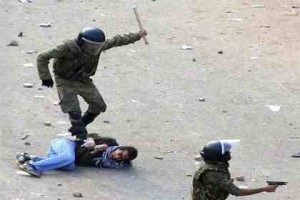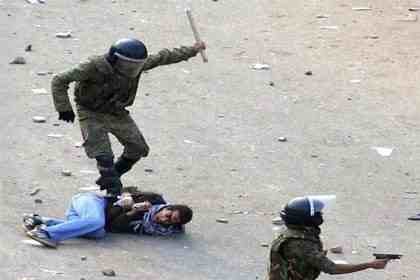
 In the first case dealing with the deaths of protesters in events related to the January 25th uprising, the African Commission on Human and Peoples’ Rights decided to consider a complaint submitted by the families of several individuals killed and injured during the Cabinet Office clashes in December 2011.
In the first case dealing with the deaths of protesters in events related to the January 25th uprising, the African Commission on Human and Peoples’ Rights decided to consider a complaint submitted by the families of several individuals killed and injured during the Cabinet Office clashes in December 2011.
The martyrs’ families submitted a complaint to the African Commission on Human and Peoples’ Rights, asking that the Commission hold Egyptian officials accountable for the death and injuries of their relatives during the clashes. At its, the organizations representing the complainants – the Egyptian Initiative for Personal Rights, Warakom Bel-taqrir, the Cairo Institute for Human Rights Studies and the National Community for Human Rights and Law – were informed by the African Commission that it was officially seized of the case.
The case concerns the Cabinet Offices clashes, which took place in December 2011 after the Supreme Council of Armed Forces (SCAF) decided to disperse a peaceful sit-in against the nomination of Kamal Al-Ganzouri as Prime Minister, outside the Cabinet Offices in downtown Cairo. The sit-in dispersal resulted in the killing of 18 protesters and injury to more than 900 others due to the excessive use of force and firearms by military and police officers. Since then, the regime has undertaken several measures to prevent the prosecution of public officials accused of taking part in the incident. 269 protesters, on the other hand, including injured victims, were referred to a criminal court in May 2012, four months after the clashes. In November 2013, the Court decided to recuse itself from the case. In March 2014, the protesters were referred to another circuit which deals specifically with terrorism charges. As of to date, the case in which the protesters are accused is ongoing, while no progress is made in the case dealing with the responsibility of public officials.
Seizure of the case by the Commission means that the complainants and the government of Egypt will now be required to submit arguments as to the admissibility of the case before the African Commission. At the heart of the admissibility inquiry is the question of whether or not justice has been possible to achieve through the Egyptian judicial system. In their submission to the Commission, the complainants indicated their inability to obtain domestic justice despite extensive efforts over the past two and a half years. During that period, lawyers representing the complainants were unable to obtain any information from the judges responsible for the investigation and prosecution of the case about the progress of their investigations. In addition, those judges consistently abstained from responding to requests by Egyptian courts to submit a copy of the report of the fact-finding committee which was constituted in 2012, and to provide updates on the progress of their investigations. Moreover, there has been no response to several complaints submitted by the victims’ lawyers to the Judicial Inspection Administration against the relevant investigative judges. Furthermore, as of today, no investigations have been carried out in response to several complaints submitted to the Public Prosecutor’s Office regarding incidents of torture, medical negligence, enforced disappearance and arbitrary detention.
The case is not the first concerning Egypt to be submitted to the African Commission. In March 2013, the African Commission ruled on one such case, finding that the Egyptian Government had violated the African Charter in relation to the sexual harassment of female journalists and activists who were attacked by security forces on May 25th, 2005 (an incident known as “Black Wednesday”). The Commission found in that case that the Egyptian Government was required to re-open investigations, prosecute perpetrators and compensate complainants for the physical and psychological damages they endured. As of to date, the Egyptian Government has failed to comply with any part of the Commission’s decision.
In their submission, the complainants called upon the African Commission to rule that the Egyptian Government has violated several of the human rights guaranteed by the African Charter on Human and Peoples’ Rights. The Charter was ratified by the Egyptian Government in 1984 pursuant to Presidential Decree N. 77 for 1984 and was incorporated into Egyptian law after it was approved by the People’s Assembly and published in the Official Newspaper in 1992.
In this case, the complainants have requested that the Egyptian Government fulfill its duty to promptly, adequately and impartially investigate the incidents related to the Cabinet Offices clashes and to prosecute and punish the perpetrators. The complainants requested that the African Commission urges the Egyptian Government to undertake a number of structural reforms in order to prevent such violations from occurring in the future. Such reforms include the reform of the Military Justice Code to provide the ordinary prosecution and courts exclusive jurisdiction over allegations of violations by military personnel against civilians, and reform of the laws and procedures relating to freedom of assembly in order to guarantee the protection of that right, including by ensuring that the excessive use of force is absolutely prohibited.
Share this Post

